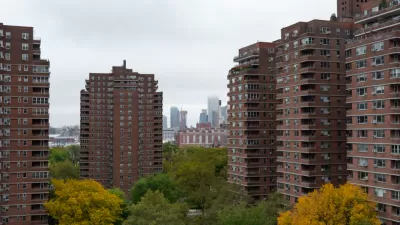District council members and local tenant advocates are engaged in a bit of tug of war about how far the District should go to limit the amount landlords can raise rents.

Ally Schweitzer reports on the ongoing debate about rent control in the nation's capital:
Tenant advocates have been pushing to overhaul rent control in D.C. for about a year. But over more than nine hours of public testimony Thursday, it became clear that those advocates do not like most rent control legislation the D.C. Council has offered so far.
Tenant advocates are asking for the rent control system already in place for about 90,000 units to remove exceptions that have allowed some landlords to shed the tenant protections. The erosion of rent control has greatly contributed to the displacement of Black communities, according to a soundbite from Victoria Gonçalvez, a tenant organizer with the Latino Economic Development Center, in the article.
D.C. Council housing committee chair Anita Bonds (D-At Large) has proposed five bills intended to shore up rent control in the District. Here's how Schweitzer describes those bills:
Two of the bills discussed Thursday would impose new limits on landlords seeking rent increases to pay for improvements to their properties. Another would partially restrict the controversial practice of rent concessions, another way property owners can raise rents beyond the legal limit. A fourth bill would impose a two-year moratorium on what are known as voluntary agreements, which are intended to help landlords negotiate rent increases with tenants in exchange for renovations, but at some buildings have been used to slowly wipe out rent control. The most drastic measure — supported by a majority of the Council and some landlord representatives — would limit rent-controlled housing to lower-income residents.
In response, tenant organizations, cited by name in the source article, are calling for "sweeping set of reforms that would apply rent control to thousands more apartments and further limit how much landlords can raise rent each year, among other changes," according to Schweitzer.
FULL STORY: At Hearing, D.C. Landlords And Tenant Advocates Poke Holes In Proposals To Tweak Rent Control

Planetizen Federal Action Tracker
A weekly monitor of how Trump’s orders and actions are impacting planners and planning in America.

Maui's Vacation Rental Debate Turns Ugly
Verbal attacks, misinformation campaigns and fistfights plague a high-stakes debate to convert thousands of vacation rentals into long-term housing.

Cuomo Is the Candidate of Both NIMBYs and Developers. What Gives?
In the New York City mayoral race, odd bedfellows align to preserve the housing status quo.

San Antonio and Austin are Fusing Into one Massive Megaregion
The region spanning the two central Texas cities is growing fast, posing challenges for local infrastructure and water supplies.

Charlottesville Temporarily Has No Zoning Code
A judge ordered the Virginia city to throw out its newly revised zoning code, leaving permitting for new development in legal limbo.

In California Battle of Housing vs. Environment, Housing Just Won
A new state law significantly limits the power of CEQA, an environmental review law that served as a powerful tool for blocking new development.
Urban Design for Planners 1: Software Tools
This six-course series explores essential urban design concepts using open source software and equips planners with the tools they need to participate fully in the urban design process.
Planning for Universal Design
Learn the tools for implementing Universal Design in planning regulations.
Heyer Gruel & Associates PA
JM Goldson LLC
Custer County Colorado
City of Camden Redevelopment Agency
City of Astoria
Transportation Research & Education Center (TREC) at Portland State University
Jefferson Parish Government
Camden Redevelopment Agency
City of Claremont





























